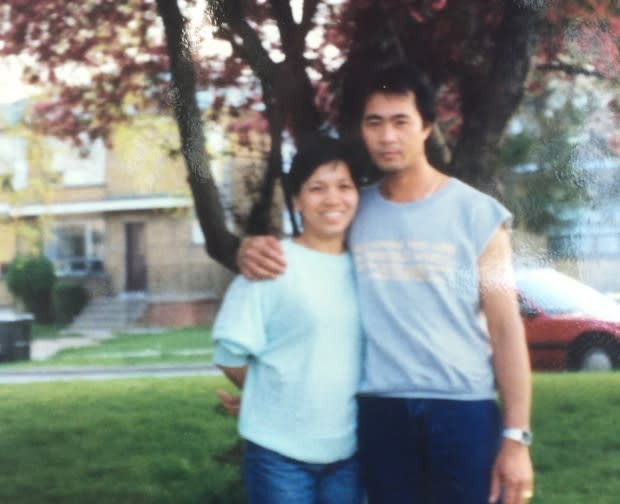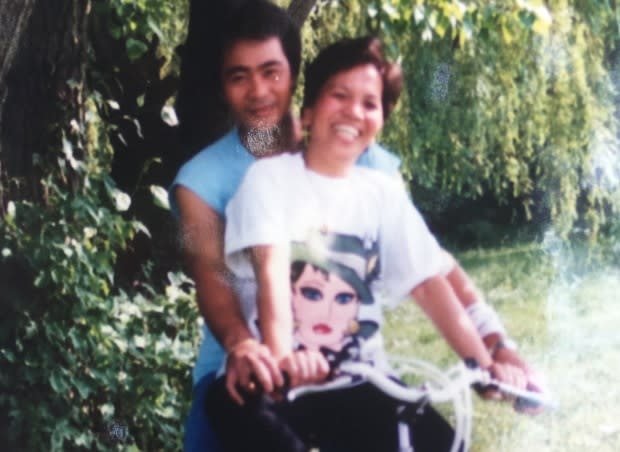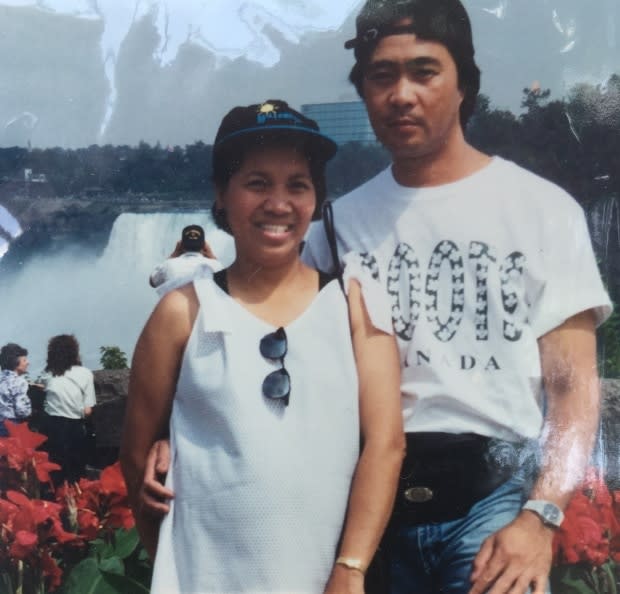A healthcare worker got COVID-19 and survived — then lost her partner of 40 years to the illness
Felicidad Maloles walks through her front garden, stopping in front of a lush peony bush.
She snips three big, pink blooms — vibrant and full of life.
Maloles' husband of 40 years, Danilo Torres, planted the bush years earlier, she says. He was the gardener of the house, tending the plants in front of their Thornhill home where they lived for the last decade. But that responsibility — and all responsibilities — now fall on Maloles' tiny shoulders.
In late April, the 65-year-old personal support worker started to feel feverish, and test results later showed she had COVID-19. She stayed in her room, under quarantine, while Torres and the couple's daughter dropped off meals outside her door.
As the days went along, Torres began feeling unwell too. The 69-year-old retired factory worker brushed off his family's concerns. But on April 27, he was so pale and weak that Maloles and her daughter helped the tall, hunched-over father make the short walk to their car so the family could take him to a nearby hospital.
That same day, Torres was admitted to the intensive care unit. Maloles never saw him in-person again while he was conscious. He died in hospital on May 26.
"We didn't have any closure, to say goodbye," Maloles says, her normally-jovial voice stifled by tears.
"I'm so stressed, and blaming myself because I got the virus," she adds. "If I didn't get the virus — maybe he would not die."
More than 5,000 infected healthcare workers
So far, more than 5,000 health-care workers across Ontario have contracted COVID-19, making up close to 17 per cent of all cases. Multiple frontline staff have also died. What's less clear is how often infected workers are spreading the virus to their loved ones — leading to unbearable family tragedies like what Maloles is now experiencing.
The long-term care home where she has worked since 2005 — Villa Leonardo Gambin in Vaughan — has been a hotbed for COVID-19 cases, with more than 75 infections confirmed among residents and staff amid an ongoing outbreak that has left 11 people dead.
"One of the untold stories of this pandemic is what happens to the selfless heroes who become infected while caring for our sick and elderly when they go home," says Charlene Nero, a regional director with LiUNA Local 3000, the union representing Maloles in her role.
"Their valiant and heroic commitment doesn't stop when they walk out the doors of their workplaces."

The union is among those calling for better protections for healthcare workers in long-term care. Maloles says in her workplace, there was limited access to personal protective equipment, even after the outbreak started in early April.
Her union is also accusing the company managing the home, Sienna Senior Living — which owns dozens of long-term care and retirement homes across Ontario, including multiple ones facing deadly outbreaks — of not providing any sick pay or compensation to Maloles after May 8 while she continued recovering at home.
The company also made headlines recently after a high-ranking official with Sienna-owned Woodbridge Vista Care Community in Vaughan, Ont. lost her job after she was overheard mocking residents' family members during a virtual town hall.

In a statement provided by email to CBC News, Andrew Iacobelli, chair of the board of directors for Villa Leonardo Gambin, said the facility has worked to ensure there are ample supplies of personal protective equipment available, including N95 masks, both before and during the pandemic.
A Workplace Safety and Insurance Board (WSIB) claim is submitted to the board for consideration when employees test positive for COVID-19 since they must self-isolate for 14 days, Iacobelli said in response to a CBC News question about compensation for ill workers.
"After an employee has been cleared to return to work, they will be moved off WSIB when the claim is approved," he said.
When asked about the broader risks facing healthcare workers, and what the province plans to do to protect them as Ontario continues reopening, health minister Christine Elliott stressed the ongoing efforts to procure personal protective equipment for healthcare staff.
"It's a tragedy that anyone has lost their life due to COVID-19," she said.
'I don't know what to do'
A tragedy Maloles now knows herself.
Sitting in the garden her partner planted, she flips through a photo album, showing photos of the couple in their younger years.
There's Torres riding a bike, with a grinning Maloles perched with her feet on the bars; there's the young Filipino couple standing with the CN Tower behind them after moving to Canada decades ago; there's a pregnant, beaming Maloles with Torres in 1994, both clad in white shirts and baseball caps.

Life wasn't always so rosy, Maloles admits. Several years ago, Torres was hit by a driver on his daily bike ride, and struggled with depression and lingering dizziness which left him largely housebound.
That's why Maloles assumes she brought the virus to him — she was always "work, work, work," she says, while in his retirement years, he was the one at home.
One of the most challenging aspects of watching his decline, the longtime personal support worker recalls, was knowing what all the medical updates from hospital staff really meant. His fever just wouldn't go away, they told her. His lungs collapsed, they said; then, his lungs were barely functioning at all. She knew just how bad it was.
Maloles now keeps her late husband's ashes in their home as part of a makeshift memorial. Life, she says, will go on. Somehow.
"I was so sad," she adds, crying. "Layers and layers of stress is coming to my head. I don't know what to do."

